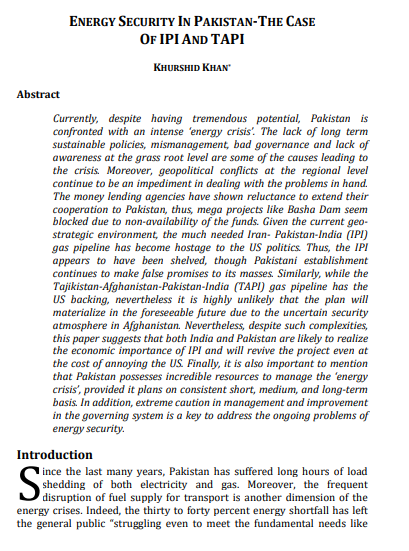ENERGY SECURITY IN PAKISTAN-THE CASE OF IPI AND TAPI
Abstract
Abstract
Currently, despite having tremendous potential, Pakistan is confronted with an intense ‘energy crisis’. The lack of long term sustainable policies, mismanagement, bad governance and lack of awareness at the grass root level are some of the causes leading to the crisis. Moreover, geopolitical conflicts at the regional level continue to be an impediment in dealing with the problems in hand. The money lending agencies have shown reluctance to extend their cooperation to Pakistan, thus, mega projects like Basha Dam seem blocked due to non-availability of the funds. Given the current geostrategic environment, the much needed Iran- Pakistan-India (IPI) gas pipeline has become hostage to the US politics. Thus, the IPI appears to have been shelved, though Pakistani establishment continues to make false promises to its masses. Similarly, while the Tajikistan-Afghanistan-Pakistan-India (TAPI) gas pipeline has the US backing, nevertheless it is highly unlikely that the plan will materialize in the foreseeable future due to the uncertain security atmosphere in Afghanistan. Nevertheless, despite such complexities, this paper suggests that both India and Pakistan are likely to realize the economic importance of IPI and will revive the project even at the cost of annoying the US. Finally, it is also important to mentionthat Pakistan possesses incredible esources to manage the ‘energy crisis’, provided it plans on consistent short, medium, and long-term basis. In addition, extreme caution in management and improvement in the governing system is a key to address the ongoing problems of energy security.

Downloads
Published
How to Cite
Issue
Section
License
License Terms








